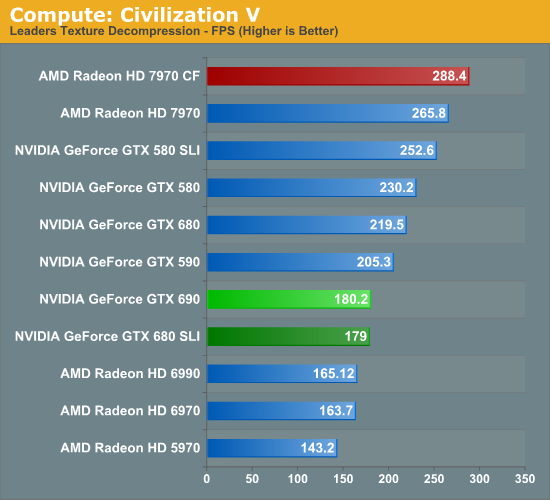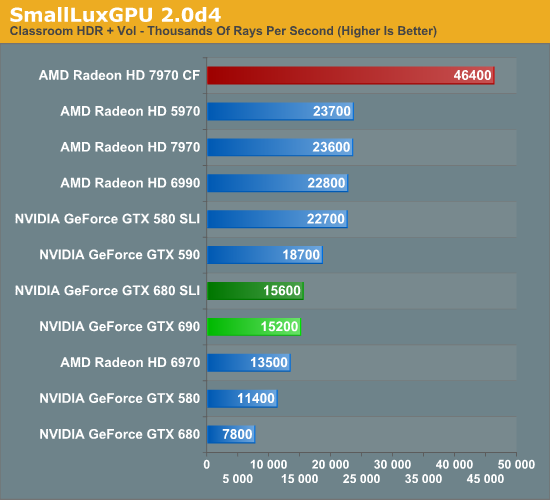NVIDIA GeForce GTX 690 Review: Ultra Expensive, Ultra Rare, Ultra Fast
by Ryan Smith on May 3, 2012 9:00 AM ESTCompute Performance
For our look at compute performance this is going to be a brief look. Our OpenGL AES and DirectCompute Fluid Simulation benchmarks simply don’t scale with multiple GPUs, so we’ll skip though (though the data is still available in Bench).
Our first compute benchmark comes from Civilization V, which uses DirectCompute to decompress textures on the fly. Civ V includes a sub-benchmark that exclusively tests the speed of their texture decompression algorithm by repeatedly decompressing the textures required for one of the game’s leader scenes. Note that this is a DX11 DirectCompute benchmark.

Given the nature of the benchmark, it’s not surprising that we see a performance regression here with some setups. The nature of this benchmark is that it doesn’t split across multiple GPUs well, though that doesn’t stop AMD and NVIDIA from tying. This doesn’t impact real game performance as we’ve seen, but it’s a good reminder of the potential pitfalls of multi-GPU configurations. Though AMD does deserve some credit here for gaining on their single GPU performance, pushing their lead even higher.
Our other compute benchmark is SmallLuxGPU, the GPU ray tracing branch of the open source LuxRender renderer. We’re now using a development build from the version 2.0 branch, and we’ve moved on to a more complex scene that hopefully will provide a greater challenge to our GPUs.

Unlike the Civ V compute benchmark, SLG scales very well with multiple GPUs, nearly doubling in performance. Unfortunately for NVIDIA GK104 shows its colors here as a compute-weak GPU, and even with two of them we’re nowhere close to one 7970, let alone the monster that is two. If you’re looking at doing serious GPGPU compute work, you should be looking at Fermi, Tahiti, or the future Big Kepler.










200 Comments
View All Comments
chadwilson - Thursday, May 3, 2012 - link
OpenCL by it's very nature is open, it is not an AMD API.CeriseCogburn - Friday, May 4, 2012 - link
Not after amd gets through with it.silverblue - Friday, May 4, 2012 - link
We'll see once somebody posts benchmarks of it.CeriseCogburn - Friday, May 11, 2012 - link
Excuse me but you're wrong, again." by Ryan Smith on Thursday, May 10, 2012
According to WinZip it only supports AMD GPUs, which is why we're not using it in NVIDIA reviews at this time. "
Ryan's comment from the 670 release review.
chadwilson - Friday, May 4, 2012 - link
You haven't bothered to do even the most basic research as to who owns OpenCL have you? Perhaps you should visit google before posting hyperboleCeriseCogburn - Saturday, May 5, 2012 - link
I'm sure the gamer's manifesto amd company "ownz it" now, and also certain it has immediately become all of yours favorite new benchmark you cannot wait to demand be shown here 100% of the time, it's so gaming evolved.CeriseCogburn - Friday, May 11, 2012 - link
Here's some research mt know it all: " by Ryan Smith on Thursday, May 10, 2012According to WinZip it only supports AMD GPUs, which is why we're not using it in NVIDIA reviews at this time. "
--
Congratulations on utter FAIL.
eman17j - Sunday, August 19, 2012 - link
look at this websitehttp://developer.nvidia(dot)com/cuda/opencl
prophet001 - Thursday, May 3, 2012 - link
First off, thank you for this review. If you didn't do this, we'd have no idea how these GPUs perform in the wild. It is very nice to come here and read a graph and make educated decisions on which card we should purchase. It is appreciated.The one thing that I wanted to question is why you feel that you can't recommend the 7970. At the very least perhaps the recommendation of which card to get should be based on the game you're playing.
Reviewing the data you published, the average frame rates for the 5 top performers over all bench marks are;
680 SLI 119 fps
690 GTX 116 fps
7970 CF 103 fps
680 GTX 72.9 fps
7970 65.5 fps
Also, the number of times which the 7970 dipped below 60 fps in the benchmarks (excluding the minimum frame rate benchmarks) alone, without the 680 doing the same was 4. This is over 29 benchmarks and some of the dips were minimal.
This aligned with the price considerations makes me wonder why one wouldn't consider the 7970?
Ryan Smith - Thursday, May 3, 2012 - link
"The one thing that I wanted to question is why you feel that you can't recommend the 7970. At the very least perhaps the recommendation of which card to get should be based on the game you're playing."Under normal circumstances we would do this. For example GTX 570 vs Raadeon HD 6970 last year; the two traded blows often enough that it came down to the game being played. However the key was that the two were always close.
In 20% of our games, 7970CF performance is nowhere close to GTX 690 because CF is broken in those games. It would be one thing if AMD's CF scaling in those games was simply weaker, but instead we have no scaling and negative scaling in games that are 5+ months old.
For single card setups AMD is still fine, but I cannot in good faith recommend CF when it's failing on major games like this. Because you never know what games in the future may end up having the same problem.